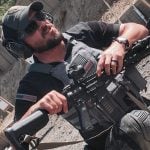In this episode of The Mag Life Podcast, Brandon Bridge and Taylor Crabtree join Daniel to talk about Average Joes, the value of teamwork, looking back on military service and the challenges of transitioning back to civilian life. On instagram you may know Brandon as Nine Banger and Taylor as Possum Puncher. Both of these guys work very heavily with the Average Joes Firearms Training Group. You may remember that we had Jimmy Rodriguez on the show recently and we’re big fans of what Average Joes does.
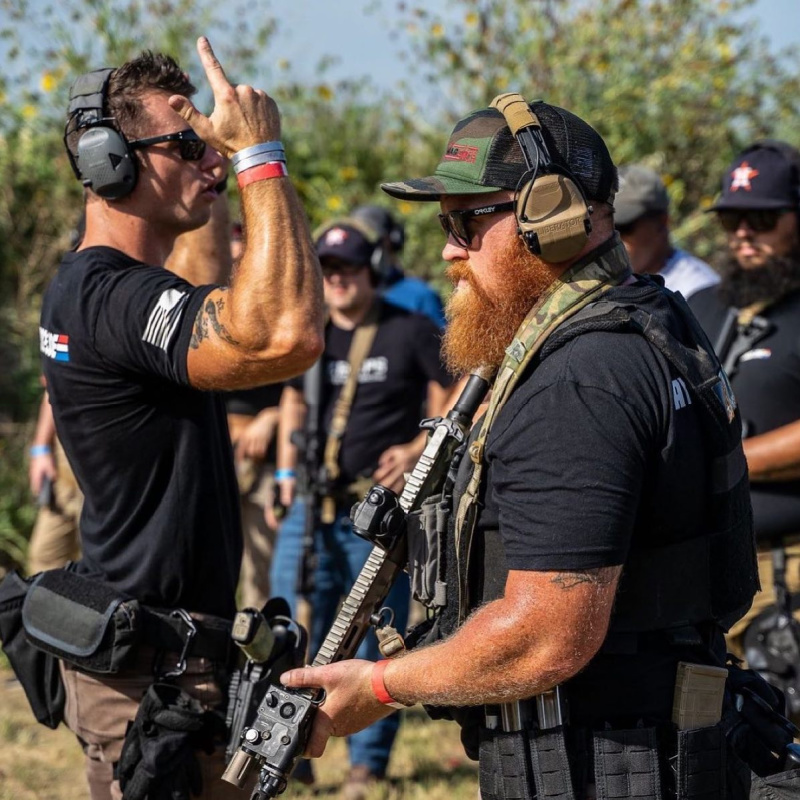
With these three guys at the table, you’ll notice a coalignment of mission set. With Brandon and Taylor involved in Average Joes and Daniel running GunMag Training, they’re all involved in training folks to be better shooters. And they all embrace the benefits of mutually supporting each other’s work.
As Daniel puts it, “I’ve never understood the at-each-other’s throats, competition side. We could get everybody who needs training in a class, filled and double the capacity of our classes, and we still wouldn’t be able to train everybody in our lifetime.”
Listen in as the three discuss their experiences and goals as firearms instructors, with a look back to their military service and how it’s impacted their lives.
Host: Daniel Shaw
Guest: Brandon Bridge and Taylor Crabtree
Introduction/Timeline: Stephanie Kimmell
1:15 Building the Training Community
Brandon points out that the Average Joes page strives to be a sounding board within the firearms training community. Instead of presenting the idea that their training is how everyone should do things, and that people should only come to their classes, they’re going forward with taking other people’s classes, and offering a snippet of the day, what it is, and where it’s at. They’ve had GunMag training on their page before, and others.
He says, “Average Joes is supposed to be a community, and it should also be a training community as well.”
2:25 The Value of Multiple Instructors
In the vast world of internet videos on firearm techniques, ideas, and concepts, Daniel notices comments from viewers who say, “no thanks, not really for me, I’m going to do what MY instructor said,” or “MY instructor said to do it this way.”
He says that tells him a lot of things. “You’ve not been exposed to enough things to really make a decision, if that’s what you should be doing or not. You need to expose yourself to more schools of thought, some more ways of thinking, more concepts and ideas. The priorities you get in my class are going to be based on my experience. It will be different with other instructors. The idea that we should listen to just one instructor in anything in life is just ridiculous — especially guns. I would like to be one of you many instructors in your quest for expertise.
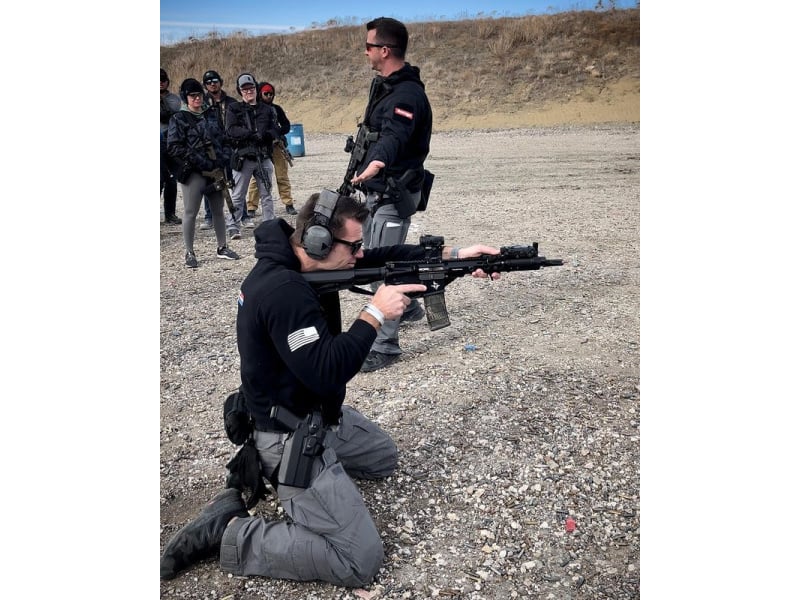
3:51 Avoid Absolutes
Brandon says that one of the biggest things he tries to bring to the group at Average Joes is that he isn’t trying to show people THE way, he shows people multiple ways.
“Whether it be presentations, draw stroke, reloads, malfunctions, target transitions, eyes leading, and then different ways of working the trigger, be it pinning the trigger, in-flight reset, or whatever it might be. I try to demo all of the different ways to acheive a certain end-goal and then let the shooter, through excercises, figure out what they do and don’t like and find their preferred method.
“So if you come out to the average Joe’s classes, we do try to keep it very grounded: here’s all the ways you could do it, here’s the pros and cons of each one, and lets have some fun doing it. I think that’s how people learn.”
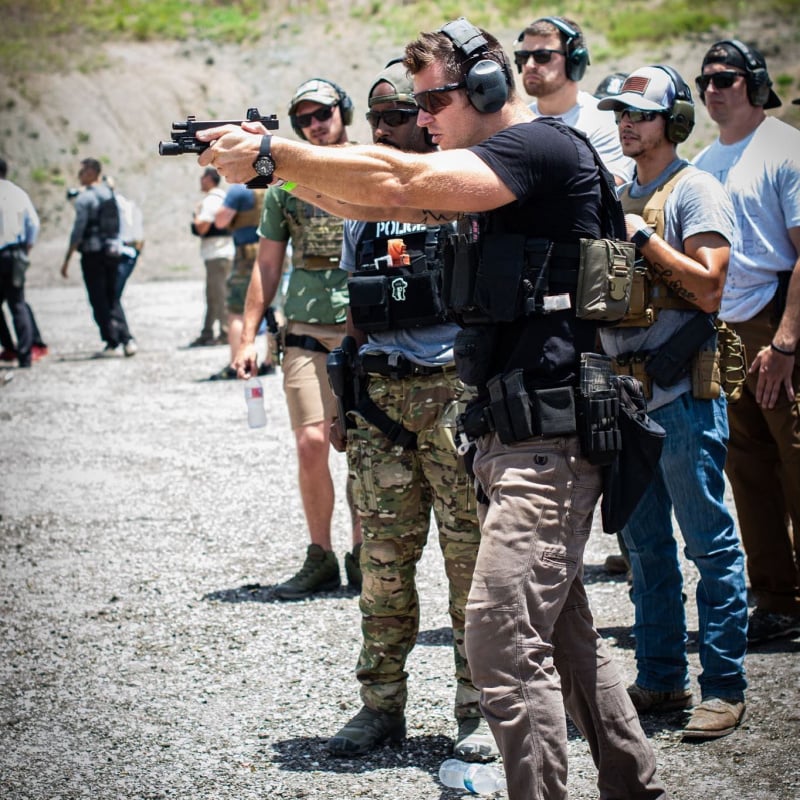
As an example, Taylor points out that they don’t present just one zero at Average Joes. Instead, “We’re going to go over the foundations of each one. One of the first thing we do in rifle class is we set everybody up and make sure they understand their zero and their holdovers… There’s more than one way to skin a cat.”
Daniel continues on that though by talking about how he covers zeroes and sending a slide home on an empty magazine after reloading.
“There’s people that say, everybody, everytime, the overhand rack, but I’m faster (and the shot timer says I’m faster) when I use the slide release. But then there’s some guns I can’t use the slide release on. There are times when, without thinking about it, I’ve reverted to the more inverted rack, where I’m just using both arms to complete the thing a little bit faster. It’s not my desired technique. It’s not my favorite of all of them, but I don’t have favorite techniques. Just like I don’t have favorite politicians.
“I don’t have favorite anything, just what is the best thing going to be for me to do right now. I’ve practiced them all at a level to where subconscously, my brain can take a fast path and just retrieve the right variation of the technique for the given situation. You don’t get that if you only have one technique.”
Brandon expands on that idea by telling us how he explains it to the new shooters in his classes. It’s about understanding the principles of what you’re trying to achieve and knowing multiple ways of doing it.
“… standing on the flat range, side-prone under a car, or behind a barricade, or in a confined position—as long as I understand the principles of what I’m trying to do, and I understand the multiple methods of doing it, if I can figure out in that situation, I can try to acheive the best outcome through multiple different ways of knowing how to do something.”
6:50 Capitalizing on a Teachable Moment
Sometimes during a class, an unexpected issue will come up that wasn’t part of the plan for the day. That happened to Brandon recently when he was a guest instructor. His block of instruction had to be very short and he wasn’t planning to go in-depth on rifle or pistol malfunctions. However, they had a bolt override on the course of fire, “The shooter goes down, buttstock still extended all the way. Cease fire. Hold what you got.”
He realized it was a perfect learning moment. He caught it right before the buttstock hit the ground, right before the buffer tube collapsed.
“We went into an indepth thing. I asked him, in front of the group because it was a learning thing, “What were you about to do?” He said, “Well, I had a failure to extract, I was about to mortar that out, then I was going to gas it back up when it was clear.”
Brandon explained to the student that there was no way that mortaring it would have done anything except further wedge the internals to the rear and get the brass stuck even more. He showed the guy the proper way to do it to avoid bending the buffer tube. From there, they discussed recognizing the difference between brass-over-bolt and bolt override, and multiple different ways to clear the bolt.
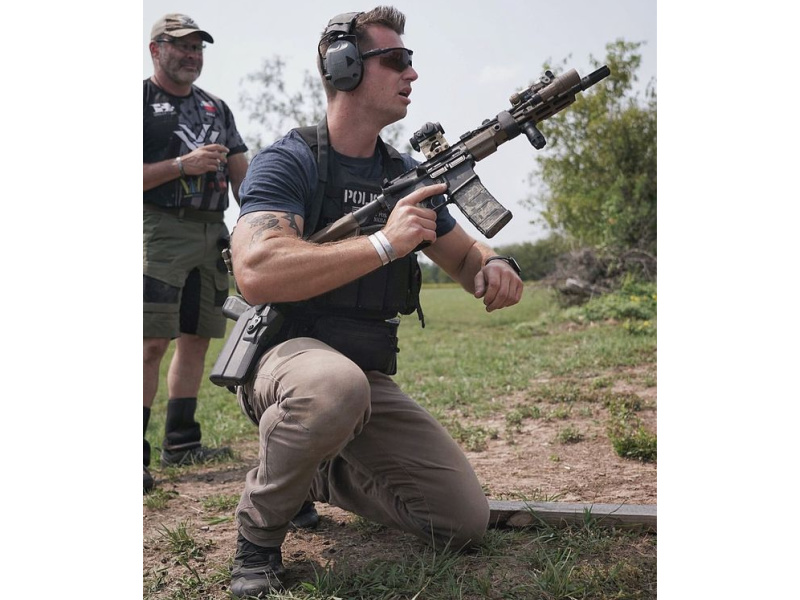
Daniel says that he works through stoppages with his students in all of his carbine classes.
“We’re talking about failure to feed, failure to fire, double feeds, failure to ejects, some of the weird stuff that happens like charging handle impingements, and brass above bolt. There’s nothing that can happen to this gun that can’t be cleared in a matter of seconds, with even one hand available.”
He says that with a rifle, it’s super simple if you know how to do it. He’s watched tons of videos of law enforcement officer with handguns and rifles. In some, they have a problem with their rifle and put it down.
“When I’m teaching law enforcement officers, I want to get one thing across to them—handguns suck. Rifles are much better at changing the behavior than handguns are. So if I’m going to go to a fight, I would like to have a rifle with me. And I would like to not trade that rifle for a handgun. So if I can keep my rifle running, I won’t have to trade it for a handgun.”
Consider the SOP for transitioning to your handgun. At what distance is it? Is it appropriate for your skill level? Is it appropriate for your team’s level of skill?
It’s important to know how to clear stoppages, and some people have no idea how to do it. And, as Daniel points out, there is a by-the-book way to do it that is agreed upon as ‘industry standard’ but there can be other ways to accomplish it too if you understand it.
This brings out an issue that comes up in training classes—sometimes people don’t want to look stupid so they don’t ask questions.
Brandon says, “It’s cool to know what you’re doing, so that makes it not cool to not know what you’re doing. A lot of times students won’t ask questions like that. If they don’t know about malfunctions. They’re not going to open up and say “Hey, I don’t know how to do that,” because they don’t want to feel stupid in front of other students.”
He also points out how instructors have different strengths. “There are those that can talk, there are those that can teach, there are those that can shoot.” He appreciates finding a person who has a really good balance between all three, and can bring all of it onto the range.
13:05 The Value of a Supportive Community
Although Brandon had a plan for eventually building his training business, it was the community that sparked its launch. According to his personal plan, he would get his own training business up and running after about ten years in law enforcement, fortified with the combined experience of wearing both the military and law enforcement uniforms.
But ultimately, it was his group of friends that he regularly shoots with that sparked the business. That group of friends quickly turned into a bunch of brand new shooters and local shooters in the area that said, “Hey, we would really love for you guys to teach some grounded, basic, intermediate and ground level classes.”
Brandon and his buddies looked at each other and had that conversation. “What does this look like and can we do it? And then lo and behold, about a year later you have this whole Average Joes thing that popped up.”
With the support of the local community and all the people they knew, it caught fire. People loved the classes, the content, and the mindset of it all. And, it’s training as a group, not just one person putting forth their ‘gospel.’
As Daniel points out, a lot of the problems they’ve been discussing today won’t exist in that kind of environment. Students benefit from multiple insights.
Brandon says they try to have at least three instructors at every class and they try to prevent one voice from overshadowing others. And the fact that the instructors have varied shooting backgrounds and experience only adds to the value of the classes.
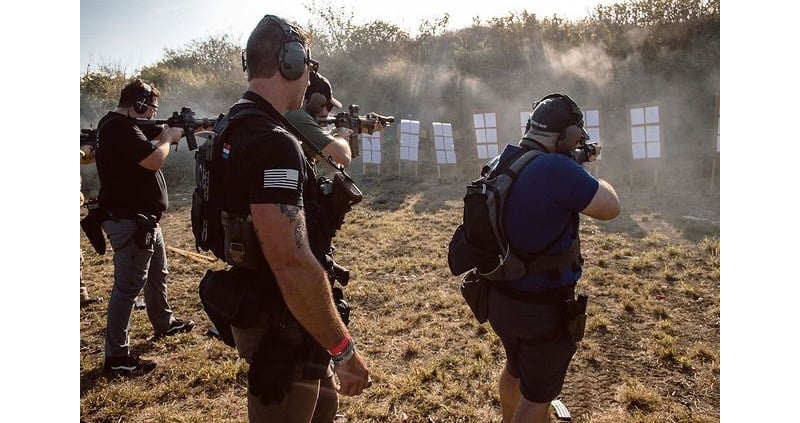
Taylor says, “Everyone at Average Joes relates to somebody. The diversity speaks volumes, especially at the range days. After we got done with our range days before our training events…t caught fire. It amazed us all. The outreach from the community for more and more and more. It’s just been overwhelming.”
16:39 Teaching New Shooters
Daniel says he loves teaching tactical teams, realizing that they get a lot of training. He gives them a lot of stuff to take back, and he enjoys it. But there’s a little bit of a thing in the gun world that he’s noticed. Not everybody wants to teach a brand new shooter — somebody that doesn’t have a clue. Some instructors just dont have the patience for that. But Daniel loves brand new shooters. And so does Brandon.
“I love those light bulbs coming on.”
“Yeah, it’s the best, right?”
Daniel says that the one thing he is good at in life is problem-solving. No matter what it is, he will figure out how to solve a problem. Thinking outside of the box, with resourcefulness, he is a problem solver. And that’s all the brand new shooter is.
I’ve got a really strong suspicion that I know what your major problem’s going to be before you even pick up the gun. Everybody has it. And I’ve already got a plan to fix that. But what else are we going to run into along the way? That’s a good time.”
Daniel appreciates watching the beginning stages, where a new shooter goes from zero skill to significantly better. He says the amount of growth that can happen in one or two days with a brand new shooter can reach is impressive, say 50 percent better each day. And as the new shooters enjoy the instruction and gain confidence, they’re going to spread their exuberance in their own communities.
“It’s awesome to see, and it’s my favorite thing. And they’re also going to be the biggest advocates for you in the future and for whatever it is you’re doing. Average Joes… you guys have a lot of those. And they’re going to get their friends into it. I’ve got people in classes all the time that tell me they don’t have any friends to go to the range with. Like, man, just go take a class one time. You’re going to have friends. Or even shoot in a competition.”
According to Brandon, the big Average Joes range days help people find others who live in their area. They are organized by zip code. So, when you go, you’ll be in a grop with people that are closest to you. The majority of people who attend Average Joes events are local shooters, but Taylor says people come out from other areas of the country.
Alot of people ask when Average Joes is coming to their area. Brandon says, “This is not something that only exists within our ecosystem. It should be within the entire country. Go out, and look at the kind of stuff we’re doing, take it as kind of a game plan.”
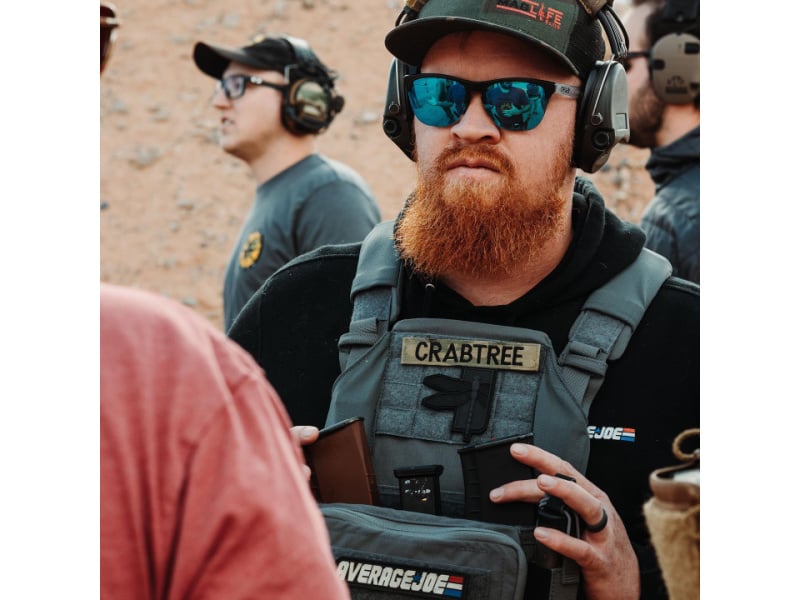
They put all of their exercises out there with their mindset behind them, as well as how they train. They post videos and push their grounded mindset. “Go out with your buddies and have your own Average Joes range days where it’s you guys coming up with exercises and having fun, and pushing each other and learning.” (But, you know, don’t use their tradmark, right?)
22:14 How did Brandon get here?
Brandon’s path to Average Joes is a bit uncommon. He joined the army, served in a Ranger battalion, and has been working as a law enforcement officer and in the gun world since he got out. So how did he land in Texas, become a law enforcement officer, and become involved in the community helping regular armed citizens become a little more regulated?
Brandon says it was, “God’s plan. I will say that there were a lot of instances where there was a lot of luck, but ultimately someone had a plan for how things were going to go.”
Going back to the beginning, Brandon says he had a normal childhood. He graduated high school in ’06, then went to college in ’07-’08. At college, he was frustrated. He was a typical party kid and not a whole lot was getting done. He felt no purpose there and was haning out with the wrong people. But he had a buddy who went to remigment a couple of years before him who told him about the training and deployment cycles. I was like, “Man, that sounds really cool. I’m going to go jump out of a helicopters. I want to go overseas.”
So here’s what happened. One night he was closing down at Home Depot, where he worked. It had been a bad day. So around 11:00 at night a recruiter came through with a couple of high and tight, super-ruck dudes wearing their PT outfits. “He just comes over to me—he was in uniform, and he comes over and he goes: “Having a bad night?” I was like, “Yeah, shit night, hate it.” Slipped me his card and [said], “Just call me.” I was like, OK that’s a great sales pitch—”Call me.” It was like I just got picked up at a bar.”
Brandon had given college the old college try, for his mom. But ultimately, he hated college. He was bored, unchallenged, and couldn’t stand it. I wanted to go to a bigger pond. “You always strive for a bigger pond, because if you get comfortable and complacent, life sucks. And life sucked for me.”
A week later Brandon was at the recruitors office, and three weeks later he was off. “I left by December of ’08 and by the first quarter of 2009, I was in 3rd Ranger Batallion. I went straight to the line platoons, with 3rd Ranger Bat.”
Brandon served just over six years with five deployments, doing all the cool-guy stuff. His first three deployments were in the line platoons, and after his third deployment his platoon sargeant asked him to move over to the recce sections with him. Brandon says he didn’t have any idea what that was all about, but, always looking for a bigger pond, he knew he’d gain a more specific skill set. His last two deployments were spend in 3rd Ranger Battalion’s recce team. Ultimately, those skills have been very applicable to the law enforcement world.
At this point the conversation takes a turn toward looking back at military service. Brandon says he was, “Blessed to have served with the guys that I did and do the stuff that I did, because, sometimes I look back and I’m like yeah, how am I still here?”
Daniel says he thinks the same thing, “How did I not get in trouble and kicked out? How did I not this? How am I still alive? Right? Owe it to a lot of people.”
Brandon says when he looks at some of the old documents — the commendations and such — he thinks, “Man, that stuff really did happen.”
26:24 Looking Back on Military Service
Since Daniel got out and started teaching armed citizens, he’s been surprised by how they appreciate military service. “It was weird to me how appreciative they are of military service — the things that they do, or the things that they say, and how they express it. I’m not talking about the awkward, “Thank you for your service,” but they really hold your service in a higher reverence and regard than I ever held for anything that I did. It took me a while to transition and to realize that.
In the last couple of years, he’s been thinking more about it — the things that he did that risked his life because really, he’d be embarrassed not to, considering the people he was surrounded with. Being a leader in the Marines held him to a higher standard and motivated him. “It’s like, I wasn’t doing these things. It was part of the programming. It took me a long time to realize exactly what we did, and the magnitude of it. I don’t even know if I still truly get it.”
But he thinks that the citizens who didn’t do it have a completely different perspective. Some veterans will say that people who didn’t serve in the military will never get it, but Daniel says, “Man, sometimes I think I don’t get it. But they get it better than me. Because it was everyday life, and you just kind of gloss over it.”
“But I hear them, and now that I’m older and I’m thinking about it, I’m like, that was significant. And I could have not been here. There’s a lot of things that… wouldn’t have happened if that didn’t work out the way it did. And there was a thousand other options for how it could work out a different way. So, its really weird looking back on that.”
Brandon comments on how he’s noticed that the people who are most appreciative of it are the people that aren’t in the US but the people actually in those countries where they served.
Another thing these guys talk about from the time they were in the service is how social media wasn’t as prevalent and they didn’t have personal cameras at the ready. For Daniel, back in 2003, they all had disposable cameras.
Brandon says he has hardly any photos from his early deployments, largely because he was in a total OPSEC (operations security) environment. Cell phones were not allowed and Brandon says it’s the same thing in law enforcement. “A lot of SWAT teams don’t want to take a lot of photos, but ultimately what do you have to look back on? If at the end of your career you look back on, I wish I had more photos from my first, second, third…”
Both guys got some cool pieces of paper, and Brandon has some cool photos, but it’s nothing like nowadays.
Daniel says if he could change anything, he wouldn’t change his path, but he would have had a camera with him to take video and photos. I definitely would have taken some more pictures and enjoyed some moments a bit better, that you don’t realize at the time, they’re never coming again. It’s miserable, but it’s awesome at the same time.”
30:04 Back to Brandon’s Story
After he got out of the military in 2014, he was dating a girl and moved to Texas. Eventually, that relationship didn’t work out, but by God’s Grace, as he puts it, being in the area brought him opportunities that he would otherwise never have been exposed to. He applied for multiple jobs, but kept getting turned down. “All I wanted to do was to go back to school after the military and work at a gun shop. I just needed some kind of extra paycheck and I wanted to work in the firearms community.”
But then one day he was shooting at a pistol match and a guy who knew he was looking for work suggested he check out a new ammunition company that just started up. Long story short, he got on with a budding new ammunition company, Stand 1 Armory, and everything took off from there.
“Doing that, one pond leads to the next. I was working at the ammunition company, doing all that, handling all their social media, got tied into ETTS, doing range days, met a couple of other vets who wanted to create a little training company out at ETTS. They brought me on and we started teaching classes out there together.”
After teaching for a couple of years, Brandon realized that he missed what he calls, “game days.” He had come from a team environment with different operational capacities. As things stood at that time, he had no game days.
“It was just going to the range, putting holes in paper, I’m trying to figure out where the game day is, what am I ultimately training for? It’s great to keep regurgitating all these stories, this information, and teaching these shooters here, but ultimately where’s my growth? I wasn’t going to as many classes or training events, prepping for “game day.” And I missed the team environment. I missed the ready room. I missed the uniform. I missed the comm checks, I missed the team aspect. All of that.”
One of the guys he was shooting with asked him to come try out at one of the LE departments. He took the test, and fast-forward five and a half years, and now he is working with that guy in the same department. “He and I are almost blood brothers. We work together within the full-time SWAT team of our department, having those game days. It’s not just a range day. It’s not just a training day. It’s again training for game day, which we have quite a lot of those.”
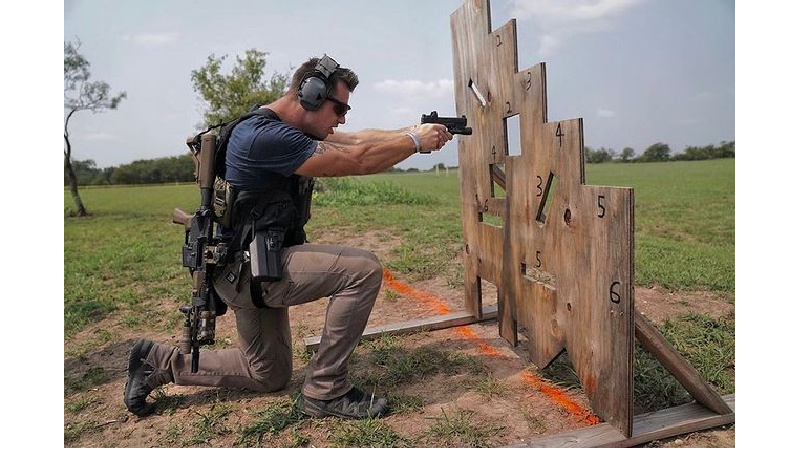
Brandon offers some advice to anybody who is getting out of the military: have a plan. You can do anything you set your mind to, just please, have a plan.
37:07 More on Transitions
Brandon talks about how working as a law enforcement officer is different from the military. “Under our penal codes, underneath the color of the law, what we do as SWAT officers, is a hundred thousand times different. I cannot overstate how different the two worlds are. And going from one world to the otherworld was, for a little while, quite challenging, and still is challenging today.
“I’m still finding those nuances of slowing things down, doing things a little more surgically, and then of course the tactics within the structure are completely night and day different. People don’t give SWAT officers enough credit for how stringent they have to train, what level they have to train to. It’s one thing to have an oopsie overseas, it’s a completely different thing to have it happen here in the states. It’s mind-blowing. There’s no room for error.”
Daniel says he always sees a transition for veterans who get out of the military. He believes he was lucky to have started this podcast several years before he got out because he had people helping him with the transition along the way. He has a lot of friends that he tries to help out that start teaching. Some of them get out and start teaching, locally or even nationally traveling around. They’re making that transition from military operations in an urban environment or some super high-speed SF-type stuff to self-defense situations that might occur at 2 a.m. at the gas pump with a couple of kids in the back seat. Or, in an in-home self-defense type situation.
“The team-based combat, pre-planned, executing an order—it’s very different than what we’re talking about when most defensive shootings occur. So, there’s a big transition.”
41:18 Appreciating Law Enforcement Officers
Daniel speaks to people in law enforcement:
“You guys, SWAT guys, regular patrol officers, whatever you’re doing, the idea right now, as much as you’re hated in this country. It’s still getting up, and putting that belt on, and going to work every day, it’s dedication.”
He has been teaching for seven years at the Ohio Tactical Officers Association (OTOA), where he’s met and learned from a lot of ‘switched on’ people.
“These are good people. It bothers me a lot when people are downing on officers, because they don’t know them like I know them. I also know some that they are absolutely right about. That they’re absolutely wrong, for this country, for our freedom, for our liberty, for the way that we do things, for American values — but that’s not most.
Brandon agrees, noting that with any organization there will be bad apples. But in large part he doesn’t thin law enforcement officers get the credit they’re due. There are millions of LE officers, but one bad experience with a law enforcement officer can cause a social media storm with profound impacts throughout the community.
Brandon says the average patrol officer is not appreciated enough, “Because there is no other job where people are slaving day in, day out for 12, 14 hour days — that mundanity — and you’re waiting for game day. You’re having to go from one traffic accident to the next and you’re slaving away.
“If you’re a patrol officer and you’re listening, and you don’t know if it’s worth it, trust me, your job is worth it. Your game day will eventually come. You cannot stop training for game day. Stay switched in and don’t give up. The media doesn’t hate you, America doesn’t hate you. Just stay switched on, because it’s coming.”
He further encourages patrol officers to, “Stay focused on the positive contacts. If you get so hung up on all your negative contacts, its going to grind you down. Stay focused on that — “Wow! I really did do that. Wow! I really did help pull that person out of a burning car. Wow! I really did pull that girl off of a bridge who was about to jump.”
“Think about all of those positive contacts that you’ve had and don’t those fade away into obscurity with the hundreds of people that are going to yell at you because you’re not doing your accident report correctly. Don’t get discouraged by that. Stay switched on because you are needed.”
44:13 The Power of Positivity
At this point, the conversation turns to how the ability to keep a positive outlook makes a difference in life. Daniel says he doesn’t run into a lot of combat veterans that are as hippie as he is about positivity, but he’s not sure when he became that way.
“Was talking with a friend recently, talking about Ukraine, pop culture, and some other things and I was like, “Man, when did I become a hippie?” When I was a kid, we looked at people from the 60s and 70s — the hippies, and I’ve kindof become that way. I’m still totally cool with violence when it’s warranted, turn it to 11. But, at the same time, I’m cool with just being nice to everybody and promoting this idea of positivity and togetherness. Tu Lam was on the podcast recently, he’s also a thinker like that.”
Daniel finds that the veterans who have the mindset of finding the positives, and who cognitively choose to not respond negatively to things they would otherwise respond negatively to, are more successful, calm, down to earth, and just chill.
“Maybe they deal with some depression, PTSD, some things like that, but it doesn’t take over their life. I think it’s because they have that hope. It might be spirituality, your positive mindset, despite some things you’ve been involved in and seen in your life, but you’re choosing the positive path, when it would be so easy and you would have every excise to choose the negative path. ”
In Daniel’s problem solver class, he tells his students there’s always a way to fight. “You gotta find it. You can take a break when it gets dark. There’s always a — your gun goes down, your arm’s broken, whatever happens, there is always a way to fight. It might be the most awkward shooting position ever. Whatever. Find a way to get hits. And, I think in life, that same mentality works, too.”
Whatever it is you want to achieve, you may have a lot of work ahead of you, but every day that you don’t take a step in that direction is one more day until you achieve your goal. So it’s all about doing.
Taylor brings up one small way he keeps himself motivated with Post-It notes he keeps in his vehicles and on top of his mirror at home.
“It’s just a simple message and it helps me. Every day I listen to it, I move forward in my life. It says, “Do better.” “Do it better.” is what it says in my work vehicles. I’ll get in my truck — I’ve had a bad day — “Do it better.” It’s just simple, it’s easy, its maybe not what you want to hear at the time. Or, when I’m having a great day — everything’s going right — I just made a great sale for the company, my guys are doing awesome, and I sit there and I see, “Do it better.” It’s how I like to live. It helps me move forward in everything I do. And every time I just shut up and listen to myself, and just do it better — because you can every day — the jumps in my life have been enormous.”
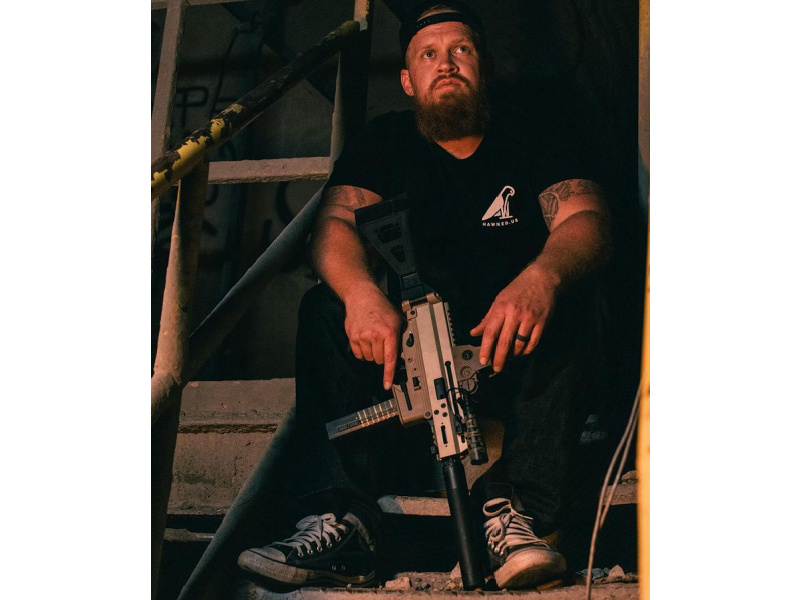
Brandon’s motivational motto is inside his range box. Every time he opens it, he sees, “Don’t suck.”
And that’s the thing about standards. If you hang out with a group of people who have low standards for whatever they’re doing, whether it be life, shooting, or anything else, you’re going to adopt low standards yourself. But, if you hang out with people who have high standards, and you mutually hold each other to high standards, everybody’s going to grow and maybe even exceed your standards to set new ones.
Together we achieve more. Since the dawn of humanity, we have not done a very good job as individuals, but when we form up in tribes and get together, we can survive, we can overcome a lot of stuff.
Podcast: Play in new window | Download


